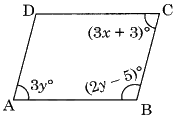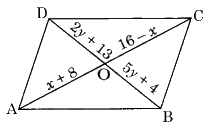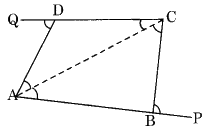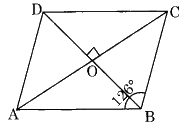Class 8 Maths Chapter 3 Question Answers - Understanding Quadrilaterals
Q1: In the given parallelogram ABCD, find the value of x and y. Ans:
Ans:
∠A + ∠B = 180°
3y + 2y – 5 = 180°
⇒ 5y – 5 = 180°
⇒ 5y = 180 + 5°
⇒ 5y = 185°
⇒ y = 37°
Now ∠A = ∠C [Opposite angles of a parallelogram] 3y = 3x + 3
⇒ 3 × 37 = 3x + 3
⇒ 111 = 3x + 3
⇒ 111 – 3 = 3x
⇒ 108 = 3x
⇒ x = 36°
Hence, x = 36° and y – 37°.
Q2: Find the values of x and y in the following parallelogram. Ans:
Ans:
Since, the diagonals of a parallelogram bisect each other.
OA = OC
x + 8 = 16 – x
⇒ x + x = 16 – 8
⇒ 2x = 8
x = 4
Similarly, OB = OD
5y + 4 = 2y + 13
⇒ 3y = 9
⇒ y = 3
Hence, x = 4 and y = 3
Q3: The sides AB and CD of a quadrilateral ABCD are extended to points P and Q respectively. Is ∠ADQ + ∠CBP = ∠A + ∠C? Give reason.
Ans: Join AC, then
∠CBP = ∠BCA + ∠BAC and ∠ADQ = ∠ACD + ∠DAC (Exterior angles of triangles) Therefore,
Therefore,
∠CBP + ∠ADQ = ∠BCA + ∠BAC + ∠ACD + ∠DAC
= (∠BCA + ∠ACD) + (∠BAC + ∠DAC)
= ∠C + ∠A
Q4: ABCD is a rhombus with ∠ABC = 126°, find the measure of ∠ACD. Ans: ∠ABC = ∠ADC (Opposite angles of a rhombus)
Ans: ∠ABC = ∠ADC (Opposite angles of a rhombus)
∠ADC = 126° (Diagonal of rhombus bisects the respective angles)
(Diagonal of rhombus bisects the respective angles)
⇒ ∠DOC = 90° (Diagonals of a rhombus bisect each other at 90°)
In ΔOCD,
∠OCD + ∠ODC + ∠DOC = 180° (Angle sum property)
⇒ ∠OCD + 63° + 90° = 180°
⇒ ∠OCD + 153° = 180°
⇒ ∠OCD = 180° – 153° = 27°
Hence ∠OCD or ∠ACD = 27°
Q5: Write true and false against each of the given statements.
(a) Diagonals of a rhombus are equal.
(b) Diagonals of rectangles are equal.
(c) Kite is a parallelogram.
(d) Sum of the interior angles of a triangle is 180°.
(e) A trapezium is a parallelogram.
(f) Sum of all the exterior angles of a polygon is 360°.
(g) Diagonals of a rectangle are perpendicular to each other.
(h) Triangle is possible with angles 60°, 80° and 100°.
(i) In a parallelogram, the opposite sides are equal.
Ans:
(a) False
(b) True
(c) False
(d) True
(e) False
(f) True
(g) False
(h) False
(i) True
|
81 videos|423 docs|31 tests
|
















